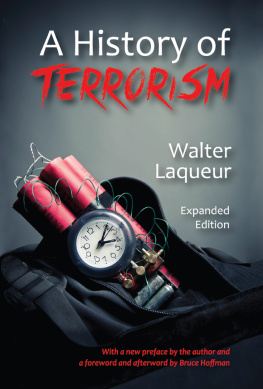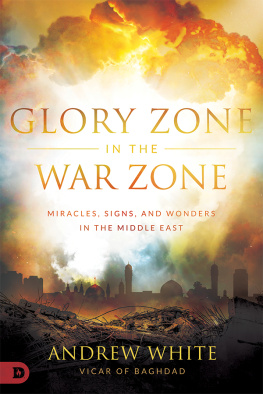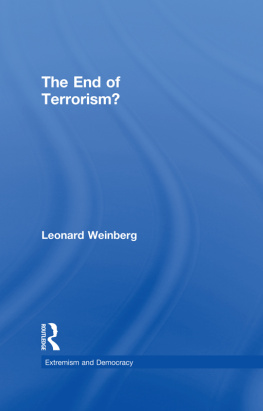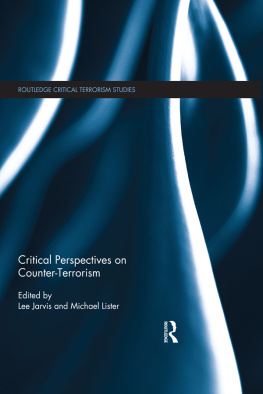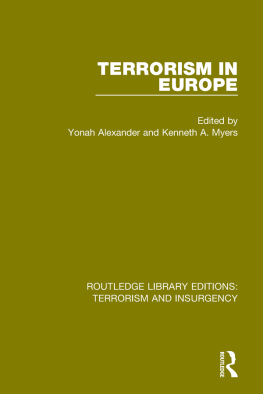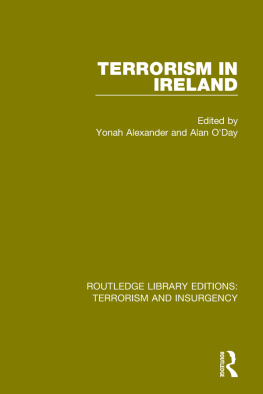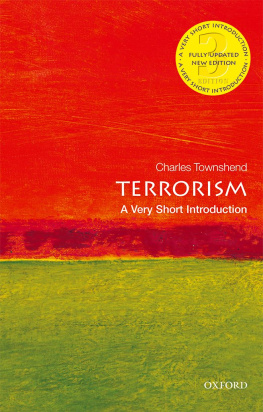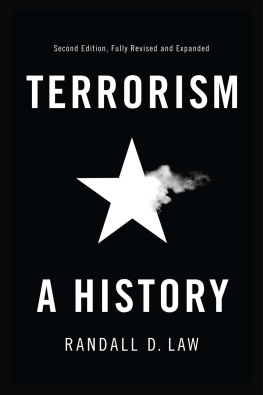Originally published in 1977 by Little, Brown & Co.
Published 2001 by Transaction Publishers
Expanded edition 2016
Published 2017 by Routledge
2 Park Square, Milton Park, Abingdon, Oxon OX14 4RN
711 Third Avenue, New York, NY 10017, USA
Routledge is an imprint of the Taylor & Francis Group, an informa business
New material this edition copyright 2001 and 2016 by Taylor & Francis.
All rights reserved. No part of this book may be reprinted or reproduced or utilised in any form or by any electronic, mechanical, or other means, now known or hereafter invented, including photocopying and recording, or in any information storage or retrieval system, without permission in writing from the publishers.
Notice:
Product or corporate names may be trademarks or registered trademarks, and are used only for identification and explanation without intent to infringe.
Library of Congress Catalog Number: 2001027546
Library of Congress Cataloging-in-Publication Data
Laqueur, Walter, 1921-
A history of terrorism / Walter Laqueur; with a new introduction by the
author.
p. cm.
Originally published: New York: Little, Brown, 1997.
Includes bibliographical references and index.
ISBN 0-7658-0799-8 (alk. paper)
l. TerrorisHistory. 2. Terrorism. 3. Title.
HV6431.L348 2001
303.62509dc21
2001027546
ISBN 13: 978-1-4128-6401-5 (pbk)
Reflections on Walter Laqueurs Contributions to the Study of Terrorism and Guerrilla Warfare*
Bruce Hoffman
Scholars today researching and writing on terrorism and guerrilla warfare face a daunting challenge. Walter Laqueur. While it would be fatuous to state that Walter has said or written every thing that there is to say or write about either of those two phenomena; such a claim is not entirely inaccurate. For nearly forty years, in a dozen or so books and countless articles and reviews, Walter has indefatigably shed new light on both subjects while simultaneously dismembering the conventional wisdom and dismantling the latest, vogue-ish, but substance-less, methodological fads. He has systematically demolished myths and corrected popular misconceptions. In doing so, Walter has laid claim to having the first or final wordand often boththroughout his long and intellectually luxurious career.
A modest sampling of Walters engagement with these two fields most pressing policy and intellectual issues would include:
the fools errand of divining a universal definition of terrorism;
the posited, but historically, exaggerated invincibility of the post-modern guerrilla;
religions salient role in contemporary terrorism;
the nexus of terrorism and technology;
the causal link between poverty and terrorism and with guerrilla warfare as well; and,
whether in fact a war on terrorism can ever be won in any meaningful sense.
Walters prodigious scholarly output is the product not only of his discipline and focus, but significantly also of his personal generosity and kindness and his fundamentally open and inquiring mind. His magisterial command of multiple European and Semitic languages endow his work with uncommon breadth and depth. His insatiable thirst for knowledge and daily consumption of a vast variety of print and digital media has given him a uniquely broad and dynamic perspective. Walters fervent embrace of cutting edge technology at once maintains his unrivalled access to information and opens up new intellectual paths to pursue. And, his interest in culture and society is pivotal to all the above.
But perhaps most important is Walters passion as teacher and mentor. He has long enjoyed intellectually close and affectionate relationships with both established and especially younger scholars. It is, accordingly, not an infrequent occurrence to pick up a book and scan its acknowledgements page to find Walter mentioned.
The power of Walters analysis, clarity of his thinking, and fluidity of his prose is perhaps best encapsulated by the review of Guerrilla: A Historical and Critical Study that appeared in Londons Sunday Times, upon its publication in 1976. Written by Professor Sir Michael Howard, the worlds preeminent military historian and authority on strategy and warfare, it seems now, in retrospect, as the perfect summation of Walters scholarship and contribution to the literaturedespite the fact that this was his first substantial foray into what is collectively known as violence by non-state actors. [This] huge and ill-defined subject, Sir Michael wrote
has probably been responsible for more incompetent and unnecessary books than any other outside the field of sociology. It attracts phoneys and amateurs as a candle attracts moths. When an experienced historian like Dr Laqueur announced his intention of tackling it, his admirers could not conceal their qualms. Could even he more than flounder in this Serbonian bog? The answer is that he can and does, with a mixture of massive learning and brisk commonsense.
Indeed, at the time, most treatments of guerrilla warfare and terrorism were either anecdotal or, if within the academy, uselessly theoretical. It was thus a field of study to which shady memoirists, superficial journalists and abstruse political scientists mostly seemed to gravitate. Guerrilla was thus a veritable breath of fresh air and, as would characterize all of Walters subsequent work on these subjects, a useful rejoinder to those lacking the historical perspective necessary to understand events and trends that were neither as new nor unique as the more gullible or parochial believed them to be.
The scholarly authority and masterly command of history apparent throughout Guerrilla is perhaps evidenced by the fact that, more than thirty years since its publication, the twelve core principles of guerrilla warfare elucidated by Walter in its concluding chapter,
It is though in the study of terrorism where Walter has both had the greatest influence and indisputably established his lasting legacy. In the course of four seminal books spanning as many decadesTerrorism (1977); The Age of Terrorism (1987); The New Terrorism: Fanaticism and the Arms of Mass Destruction (1999); and, No End To War: Terrorism In The Twenty-First Century (2003)Walter identified, explained and illuminated the most pressing threats coming from this vexatious category of non-state actor. Not surprising, perhaps, is that the springboard for these scholarly inquiries was doubtless the academic course on terrorism that Walter conceived and taught at Georgetown University in the early 1970s: the first to be offered at a university in the United States.
Walter brought a unique sobriety and clarity to the study of this often visceral, febrile, subject. In both editions of his monumental work on the subject (Terrorism and The Age of Terrorism), he urged scholars to move beyond their paralytic attempts to define terrorism: arguing that it was neither possible nor really worthwhile to try to do so.
Walter has been equally energetic and persuasive in his debunking of theories about poverty, lack of education, and unemployment as explanations for the eruption of terrorism. It has been widely argued that a direct correlation exists between terrorism and povertythat poverty, especially in what used to be called the third world, he wrote in

